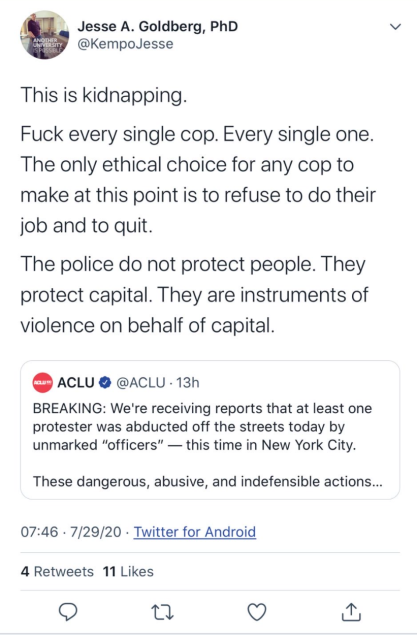Table of Contents
Lecturer’s anti-police tweet leads to legislative pressure on Auburn University, which says it is exploring 'options'

At Auburn University, an incoming lecturer’s tweets criticizing police officers has sparked calls for his termination, including from a state legislator. Today, in light of the university’s statements that its “officials” were reviewing “options” for responding to the lecturer’s “[h]ate speech,” FIRE wrote to Auburn University explaining that the First Amendment, Alabama state law, and Auburn’s own policies protect the lecturer’s speech.
In July, Jesse Goldberg — a lecturer hired last spring to teach four courses at Auburn this coming fall — responded to a tweet by the ACLU that condemned the detention of a protester by plainclothes NYPD officers:
A conservative news outlet covering the state of Alabama wrote about Goldberg’s tweet, as well as a Facebook post in which Goldberg elaborated on his view, and about Goldberg’s views on police abolition. That quickly caught the eye of Donald Trump, Jr., who criticized Goldberg:
This is what’s happening on college campuses around our country. The liberal, anti-American-values egg heads already took over the Ivy League. Now they’re gunning for middle America.
Auburn professor: 'F*** every single cop' - Yellowhammer News https://t.co/xsZ7EMJcH1
— Donald Trump Jr. (@DonaldJTrumpJr) July 30, 2020
Rep. Brett Easterbook, a state legislator who sits on the state house’s education committee, went beyond Trump’s criticism, calling for Auburn to terminate Goldberg immediately. In the comments to his Facebook post, Easterbrook pledged that Goldberg would be “dealt with at the next ALGOP meeting,” referring to the Alabama Republican Party, if he did not resign, and that the “stage is already set.”
In response to media inquiries, Auburn criticized Goldberg’s comments as “[h]ate speech” that was “inexcusable and completely counter to Auburn values” and shared that its “officials” were “considering options available to the university.”
In subsequent comments, Auburn repeated that “officials” were continuing to “assess the situation.” Auburn opined that higher education “is built upon the premise of the free expression of ideas and academic dialogue, but Auburn has not and will never support views that exclude or disrespect others, including hateful speech that degrades law enforcement professionals.” This new statement pointedly noted that “Mr. Goldberg”—who holds a doctorate—was “hired on a temporary, non-tenure-track assignment.”
That’s an ominous statement that strongly implies that Auburn will terminate, discipline, or decline to renew the contracts of faculty members whose speech catches the attention of off-campus critics or state legislators.
As our letter to Auburn today explains, it also sets Auburn on a collision course with the law.
At public universities anywhere in the country, faculty members have a First Amendment right to speak on matters of public concern, even if others find that expression deeply offensive. At Alabama institutions, they also enjoy a right under state law to “take positions on public controversies,” and it is not the “role” of the institution to suppress “unwelcome, disagreeable, or offensive” ideas and opinions. And at Auburn in particular (which has earned a “green light” rating from FIRE), university policy grants faculty the right to “speak or write on matters of public interest” without “institutional censorship or discipline.”
Advocating for the abolition of police and criticizing police offices are protected by the First Amendment. Indeed, one of the principal Supreme Court cases applying the First Amendment in the university context held that a student newspaper’s cartoon depicting a police officer sexually assaulting the Statue of Liberty was, however contrary to campus “conventions of decency,” protected speech.
As the Supreme Court explained in ruling that the First Amendment protected the right to wear a jacket emblazoned with the words “Fuck the Draft” in the hallway of a courthouse (a place not exactly known for its tolerance of colorful expression), government officials can’t be trusted to discern between what words are or are not too offensive to allow. The choice to use the most abrasive language may convey the speaker’s “emotive” purpose — a value that government officials simply cannot regulate.
Auburn’s initial statement that Goldberg’s tweet amounted to “[h]ate speech” is also a reminder that if “hate speech” were a category of unprotected speech (it is not), it would almost certainly be repurposed to suppress criticism of the authorities. That, for example, is what happened when police in Connecticut discovered a century-old law prohibiting discriminatory advertisements and repurposed it to arrest people who criticized white police officers.
Auburn — which has earned a green light rating in FIRE’s Spotlight Database by working to ensure that its policies are consistent with the First Amendment — should take a cue from former Auburn Police Chief Paul Register, now serving as the city’s Public Safety Director, who reacted to Goldberg’s comments:
This person is certainly entitled to his opinion; his comments don’t represent the “Auburn Community” that I know or hear from daily. It will not phase [sic] the professional staff we have here; they will protect him just as they do everyone else.
If former Auburn police can recognize the importance of protecting the First Amendment rights of their critics, we hope the administration of Auburn University can do the same.
Recent Articles
FIRE’s award-winning Newsdesk covers the free speech news you need to stay informed.

USC canceling valedictorian’s commencement speech looks like calculated censorship

Back into the FIRE: Hasen’s response to FIRE and Rohde: Don’t read the press clause out of the Constitution — First Amendment News 420

VICTORY: Michigan town declares Sept. 6 ‘First Amendment Day’ after FIRE sues its mayor for shouting down residents

